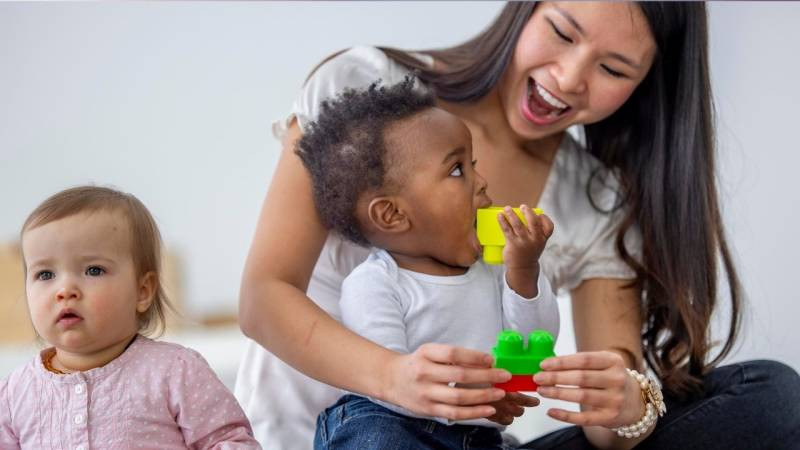Having a new baby at home is exciting and wonderful. Deciding who will care for your new baby when you return to work is exciting but maybe not so wonderful. Imagining another pair of arms caring for your little loved one can be very difficult but here are some guidelines to help you find the right fit for your family.
Should you choose in-home care or care outside of your home? Do you know that you want your baby to stay at your home while you go to work? Perhaps you work from home and would like to be able to see your child throughout any breaks within your day?
There are several options available for having childcare provided within your own home. You can choose to hire a nanny (live-in or live-out), an au pair (who will live with you for up to one year), or you can have family members come help you out. Nannies tend to be more expensive, but this is because they typically hold degrees in early childhood education and they will build a framework of learning for your child. An au pair is generally more affordable (sometimes as little as $350 per week for 45 hours) but you must provide specific considerations and amenities for the person because they will be living in your home, eating your food, possibly driving your vehicle plus you may even need to help them with educational opportunities. Another option might be a family member who is recently retired and is interested in helping take care of your baby while you’re at work.
Childcare outside of your home would be done either in a private, home-based setting or in a center-based setting with more structure and guidelines. The home-based locations tend to be more intimate with fewer children attending their programs due to state-mandated staff-to-student ratios. If a person is running a child care facility out of his or her home, there typically may be 1-2 staff on site and this would limit the number of children to 4 or 8 depending on the ages of the children. The intimate nature of a home-based facility helps the child feel like they are at a family member’s home. The house may be set up like the child’s own home with a living room, kitchen and bedrooms – this may help the child feel more at ease and comfortable throughout the day. Smaller class sizes could mean limited exposure to other children who may be ill, and this could mean less work time missed by the parents because you don’t need to stay home to care for a sick baby. Fewer playmates in the classroom could lead to higher instances of one-on-one time with the teacher which brings more time for stories, guided play, interactive moments, and learning.
Center-based facilities tend to have higher numbers of people on staff and can then have larger class sizes. Your child will be around more people which could help with socialization, interactions, and exposure to other children. This could be negative, though, if your child is frequently ill and cannot attend the program because they are not healthy enough to participate in daily activities.
Larger facilities typically provide a very structured curriculum and schedule and you could possibly even have technological perks such as webcam viewing via your smartphone throughout the day or text-message updates when your little one goes down for a nap or eats a meal. Day care centers tend to have field trips, party celebrations, and other educational opportunities throughout the year that can help foster a love of learning in a growing environment.
There’s no perfect choice when choosing the best child care for your babies. I've personally tried both the corporate day care and in-home child care and my experiences were both good and bad for each. Trust your gut and go with the situation which makes you feel the most comfortable. Because if you are not happy with the care your child is receiving, then your child surely will not feel happy. One of our main goals as parents is to see our children thrive and grow in happy ways and your child care provider should be an extension of that growth and happiness.


